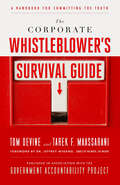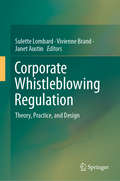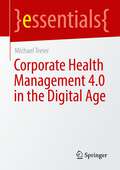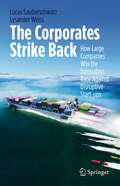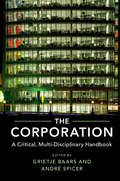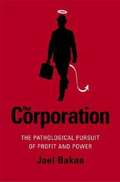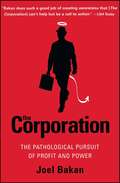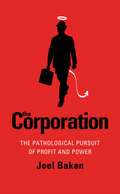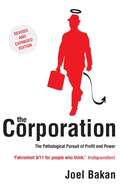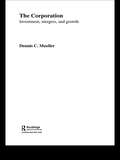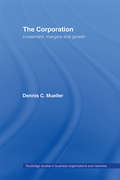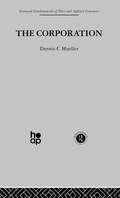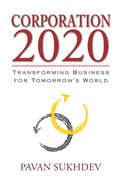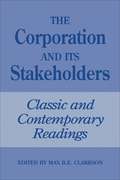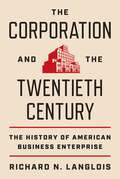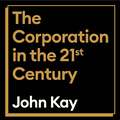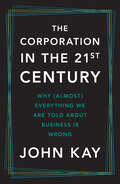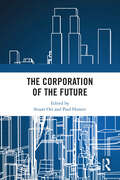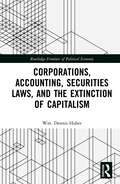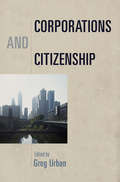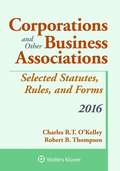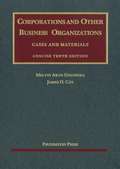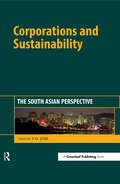- Table View
- List View
The Corporate Whistleblower's Survival Guide: A Handbook for Committing the Truth
by Tarek F. Maassarani Tom DevineFrom Erin Brockovich to Enron, whistleblowers who “challenge abuses of power that betray the public trust” have proven to be an unfortunate necessity in modern business culture. Their efforts to report crimes, fraud, and dangers to public health and safety have saved millions of lives and billions of dollars of shareholder value – and had we heeded the warnings of whistleblowers, perhaps disasters such as the Bernie Madoff scandal and the Lehman Brothers meltdown could have been averted. Recent federal legislation in finance and health reform have cemented legal protections and mechanisms for whistleblowing. This book provides a thorough guide and history to the whistleblower's legal rights. The ultimate survival guide, it provides advice on getting help and finding allies, warns that retaliation is often the reward for "committing the truth" and shows how to weather the storm. With extensive legal texts, sample letters, resources, and information on upcoming whistleblower reforms, this is the ultimate source on the subject.
Corporate Whistleblowing Regulation: Theory, Practice, and Design
by Sulette Lombard Vivienne Brand Janet AustinThis book adopts a cross-jurisdictional perspective to consider contemporary corporate whistleblowing issues from an ethical theoretical perspective, regulatory perspective, and practical perspective. It includes in particular arguments in favour of and against the adoption of financial incentive schemes for whistleblowers, as well as the potential implications of adopting such schemes. This approach provides a valuable opportunity for comparison from a law reform perspective. The book brings together authors from various jurisdictions – Canada, Australia, and the USA – who, through their exposure to this area of law, be it as practitioners, regulators, or academics, offer valuable and interesting insights on the emerging and topical area of corporate whistleblowing generally, and whistleblowing rewards in particular. These three jurisdictions were selected on the basis of their reform-oriented stance on corporate whistleblowing and/or implementation of financial incentives for whistleblowing, creating an opportunity to assess contemporary regulatory structures and in particular how incentives measures could interact with corporate whistleblowing regulatory frameworks, and how they could contribute to improved governance. The reasons for the rejection of the notion of financial incentives in the United Kingdom are also reviewed, in order to provide a comparative overview. The book provides useful guidance for those who may be affected by the implementation of corporate whistleblowing schemes, including for reward, whether as regulators, practitioners, company directors, or whistle blowers.
CorporateHealthManagement4.0inthedigitalage (essentials)
by Michael TreierThe essentials discusses the possibilities of digital occupational health management (D-BGM), from health communication such as health portals to wearables and health apps to online coaching, with regard to the requirements of Work 4.0. The reader receives information on the integration of digital components in the health management portfolio and an argumentation sketch with regard to the benefits of digitalization for increasing the effectiveness of health management measures in a modern working world. Corresponding success factors are elaborated and the potentials and risks of D-BGM are identified.
The Corporates Strike Back: How Large Companies Win the Innovation Race Against Disruptive Start-ups
by Lucas Sauberschwarz Lysander Weiss65% of global CEOs are concerned about losing the innovation race against disruptive start-ups. The supposed solution: copying their methods. But as corporations are not start-ups, this is a fatal mistake. Most ideas never reach successful implementation, and innovation becomes frustration. So how does a solution look like that enables large firms to systematically leverage their existing strength and thus win the innovation race sustainably? The answer is the 5C process for efficient innovation. This book closes a gap in the practice-oriented innovation literature - and brings the desire for innovation back to established companies. The road to successful innovation management is long - this book is the shortcut.Thomas Weiler, VP Innovation Portfolio & Strategic Programs, Deutsche TelekomAn overdue update on traditional R&D processes for the 21st century.Uwe Wagner, CTO, Schaeffler Anyone who has ever experienced the methodology described here in practice will hide the book from the competition!Dr. Carsten Stöcker, World Economic Forum, Global Future Council-Member
The Corporation
by Grietje Baars André SpicerThe corporation has become an increasingly dominant force in contemporary society. However, comprehensive, in-depth analysis of the concept of the corporation is often restricted, or limited to one disciplinary approach. This handbook brings together the cutting-edge scholarship, expertise and insight of leading scholars in a wide range of disciplines, notably management studies, law, history, political science, anthropology, sociology and criminology, using a critical approach to dissect and understand the corporation. Ten chapters provide overviews of the state of play of critical scholarship on the corporation in each of these disciplines. Further contributors tackle current hot topics, such as corporate social responsibility, corporate crime, global value chains, financialization, and the interaction between corporations and communities. Finally, they consider resistance and alternatives to the corporation. With its interdisciplinary approach, this book is an invaluable resource for all readers studying the past, present and future of the corporation.
The Corporation: The Pathological Pursuit of Profit and Power
by Joel BakanIn the most revolutionary assessment of the corporation as a legal and economic institution since Peter Drucker's early works, Bakan backs his premise with the following claims: The corporation's legally defined mandate is to pursue relentlessly and without exception its own economic self-interest, regardless of the harmful consequences it might cause to others--a concept endorsed by no less a luminary than the Nobel Prize-winning economist Milton Friedman. The corporation's unbridled self-interest victimizes individuals, society, and, when it goes awry, even shareholders and can cause corporations to self-destruct, as recent Wall Street scandals reveal. While corporate social responsibility in some instances does much good, it is often merely a token gesture, serving to mask the corporation's true character. Governments have abdicated much of their control over the corporation, despite its flawed character, by freeing it from legal constraints through deregulation and by granting it ever greater authority over society through privatization.
The Corporation: The Pathological Pursuit of Profit and Power
by Joel BakanThe inspiration for the film that won the 2004 Sundance Film Festival Audience Award for Best Documentary, The Corporation contends that the corporation is created by law to function much like a psychopathic personality, whose destructive behavior, if unchecked, leads to scandal and ruin.Over the last 150 years the corporation has risen from relative obscurity to become the world’s dominant economic institution. Eminent Canadian law professor and legal theorist Joel Bakan contends that today's corporation is a pathological institution, a dangerous possessor of the great power it wields over people and societies. In this revolutionary assessment of the history, character, and globalization of the modern business corporation, Bakan backs his premise with the following observations: -The corporation’s legally defined mandate is to pursue relentlessly and without exception its own economic self-interest, regardless of the harmful consequences it might cause to others. -The corporation’s unbridled self-interest victimizes individuals, society, and, when it goes awry, even shareholders and can cause corporations to self-destruct, as recent Wall Street scandals reveal. -Governments have freed the corporation, despite its flawed character, from legal constraints through deregulation and granted it ever greater authority over society through privatization. But Bakan believes change is possible and he outlines a far-reaching program of achievable reforms through legal regulation and democratic control. Featuring in-depth interviews with such wide-ranging figures as Nobel Prize winner Milton Friedman, business guru Peter Drucker, and cultural critic Noam Chomsky, The Corporation is an extraordinary work that will educate and enlighten students, CEOs, whistle-blowers, power brokers, pawns, pundits, and politicians alike.
Corporation: The Pathological Pursuit of Profit and Power (Collection Revue Commerce)
by Joel BakanAs incisive as Eric Schlosser's bestselling Fast Food Nation, as rigorous as Joseph E. Stiglitz's Globalization and Its Discontents, and as scathing as Michael Moore's Stupid White Men, Joel Bakan's new book is a brilliantly argued account of the corporation's pathological pursuit of profit and power. An eminent law professor and legal theorist, Bakan contends that the corporation is created by law to function much like a psychopathic personality whose destructive behavior, if left unchecked, leads to scandal and ruin.In the most revolutionary assessment of the corporation as a legal and economic institution since Peter Drucker's early works, Bakan backs his premise with the following claims: • The corporation's legally defined mandate is to pursue relentlessly and without exception its own economic self-interest, regardless of the harmful consequences it might cause to others—a concept endorsed by no less a luminary than the Nobel Prize-winning economist Milton Friedman. • The corporation's unbridled self-interest victimizes individuals, society, and, when it goes awry, even shareholders and can cause corporations to self-destruct, as recent Wall Street scandals reveal. • While corporate social responsibility in some instances does much good, it is often merely a token gesture, serving to mask the corporation's true character. • Governments have abdicated much of their control over the corporation, despite its flawed character, by freeing it from legal constraints through deregulation and by granting it ever greater authority over society through privatization.Despite the structural failings found in the corporation, Bakan believes change is possible and outlines a far-reaching program of concrete, pragmatic, and realistic reforms through legal regulation and democratic control.Backed by extensive research, The Corporation draws on in-depth interviews with such wide-ranging figures as CEO Hank McKinnell of Pfizer, Nobel Prize-winner Milton Friedman, business guru Peter Drucker, and critic Noam Chomsky of MIT.
The Corporation: The Pathological Pursuit of Profit and Power
by Joel BakanNew Edition What would the world be like if its ruling elite was insane? The most powerful class of institution on earth, the corporation, is by any reasonable measure hopelessly and unavoidably demented. The corporation lies, steals and kills without remorse and without hesitation when it serves the interests of its shareholders to do so. It obeys the law only when the costs of crime exceed the profits. Corporate social responsibility is impossible except insofar as it is insincere. At once a diagnosis and a course of treatment, The Corporation is essential reading for those who want to understand the nature of the modern business system. It is a sober and careful attempt to describe the world as it is, rather than as corporate public relations departments would have us believe it to be. It reveals a world more exotic and more terrifying than any of us could have imagined. And although a billion dollar industry is trying to convince you otherwise, the corporations that surround us are not our friends. Charming and plausible though they are, they can only ever see us as resources to be used. This is the real world, not science fiction, and it really is us or them.
The Corporation: Growth, Diversification and Mergers
by Dennis MuellerThis book reviews the theory of the firm and the large modern corporation. Examining the process of entrepreneurial capitalism in which firms come into existence, then managerial capitalism and the changing motives of management in corporations - The Corporation is a thorough and thoughtful account. Of interest to students and academics in the area
The Corporation: Growth, Diversification and Mergers (Fundamentals Of Pure And Applied Economics Ser. #Vol. 1)
by Dennis MuellerThis book reviews the theory of the firm and the large modern corporation. Examining the process of entrepreneurial capitalism in which firms come into existence, then managerial capitalism and the changing motives of management in corporations - The Corporation is a thorough and thoughtful account. Of interest to students and academics in
The Corporation: Growth, Diversification and Mergers (Fundamentals Of Pure And Applied Economics Ser. #Vol. 1)
by Dennis C. MuellerFirst Published in 2001. Routledge is an imprint of Taylor & Francis, an informa company.
Corporation 2020: Transforming Business for Tomorrow's World
by Pavan SukhdevThere is an emerging consensus that all is not well with today's market-centric economic model. Although it has delivered wealth over the last half century and pulled millions out of poverty, it is recession-prone, leaves too many unemployed, creates ecological scarcities and environmental risks, and widens the gap between the rich and the poor. Around $1 trillion a year in perverse subsidies and barriers to entry for alternative products maintain "business-as-usual" while obscuring their associated environmental and societal costs. The result is the broken system of social inequity, environmental degradation, and political manipulation that marks today's corporations. We aren't stuck with this dysfunctional corporate model, but business needs a new DNA if it is to enact the comprehensive approach we need. Pavan Sukhdev lays out a sweeping new vision for tomorrow's corporation: one that will increase human wellbeing and social equity, decrease environmental risks and ecological losses, and still generate profit. Through a combination of internal changes in corporate governance and external regulations and policies, Corporation 2020 can become a reality in the next decade--and it must, argues Sukhdev, if we are to avert catastrophic social imbalance and ecological harm. Corporation 2020 presents new approaches to measuring the true costs of business and the corporation's obligation to society. From his insightful look into the history of the corporation to his thoughtful discussion of the steps needed to craft a better corporate model, Sukhdev offers a hopeful vision for the role of business in shaping a more equitable, sustainable future.
The Corporation and Its Stakeholders: Classic and Contemporary Readings (The Royal Society of Canada Special Publications)
by Max ClarksonThere is an active debate over whether the traditional purpose of the corporation – to maximize profits and financial value for the benefit of shareholders – can adequately encompass the interests of all other participants or stakeholders in the corporation's activities. Since a corporation cannot operate optimally without the support of its most important stakeholders, particularly its employees and customers, finding ways of incorporating responsiveness to stakeholder needs is vital for corporate management and governance. This anthology is designed to sharpen the debate about the role and purpose of the corporation. The debate includes such fundamental questions as: Who should be considered stakeholders? Which stakeholder interests should a corporation take into account? How should stakeholder interests be balanced against shareholder objectives (such as profits)? What changes should be made in corporate decision making and governance to reflect these new interests? This collection of seminal articles, is divided into three parts: Shareholders and Stakeholders; Morality, Ethics and Stakeholder Theory; and Stakeholder Theory and Management Performance. The articles date from 1916 to 1997, and are drawn from North American and European authors. Managers as well as researchers will find this collection presented will stimulate their thinking on the role of the corporation and its responsiveness to stakeholder interests. The volume is funded in part by a grant from the Alfred P. Sloan Foundation.
The Corporation and the Twentieth Century: The History of American Business Enterprise (The\princeton Economic History Of The Western World Ser. #119)
by Richard N. LangloisA definitive reframing of the economic, institutional, and intellectual history of the managerial eraThe twentieth century was the managerial century in the United States. An organizational transformation, from entrepreneurial to managerial capitalism, brought forth what became a dominant narrative: that administrative coordination by trained professional managers is essential to the efficient running of organizations both public and private. And yet if managerialism was the apotheosis of administrative efficiency, why did both its practice and the accompanying narrative lie in ruins by the end of the century? In The Corporation and the Twentieth Century, Richard Langlois offers an alternative version: a comprehensive and nuanced reframing and reassessment of the economic, institutional, and intellectual history of the managerial era.Langlois argues that managerialism rose to prominence not because of its inherent superiority but because of its contingent value in a young and rapidly developing American economy. The structures of managerialism solidified their dominance only because the century’s great catastrophes of war, depression, and war again superseded markets, scrambled relative prices, and weakened market-supporting institutions. By the end of the twentieth century, Langlois writes, these market-supporting institutions had reemerged to shift advantage toward entrepreneurial and market-driven modes of organization.This magisterial new account of the rise and fall of managerialism holds significant implications for contemporary debates about industrial and antitrust policies and the role of the corporation in the twenty-first century.
The Corporation in the Twenty-First Century: Why (almost) everything we are told about business is wrong
by John KayFor generations, we have defined a corporation as a business run by a capitalist elite, that uses its accumulated wealth to own the means of production and exercise economic power. That is no longer the reality. In the twenty-first century, our most desired goods and services aren't stacked in warehouses or on container ships: they appear on your screen, fit in your pocket or occupy your head. But even as we consume more than ever before, big business faces a crisis of legitimacy. The pharmaceutical industry creates life-saving vaccines but has lost the trust of the public. The widening pay gap between executives and employees is destabilising our societies. Facebook and Google have more customers than any companies in history but are widely reviled. John Kay, one of the greatest economists of our time, describes how the pursuit of shareholder value has destroyed some of the leading companies of the twentieth century. Incisive and provocative, this book redefines successful commercial activity and leadership, the knowledge economy and what the future of the modern corporation might be.'A brilliant analysis of how business really works. Informative, funny, and full of deep insights' - Mervyn King 'A very entertaining read' - Evan Davis
The Corporation in the Twenty-First Century: Why (Almost) Everything We Are Told About Business Is Wrong
by John KayA radical reappraisal of the nature and activities of business—what it is for and how it works “A characteristically acerbic analysis of the archetypal organisational unit of capitalism.”—Andrew Hill, Financial Times, “Best Books of 2024: Business” Shortlisted for the 2024 Financial Times and Schroders Business Book of the Year Award In the world of Adam Smith and Karl Marx, capitalists built and controlled mills and factories. That relationship between capital and labor continued in the automobile assembly lines and petrochemical plants of the twentieth century. But no longer: products and production have dematerialized. The goods and services provided by the leading companies of the twenty-first century appear on your screen, fit in your pocket, or occupy your head. Ownership of the means of production is a redundant concept. Workers are the means of production; increasingly, they take the plant home. Capital is a service bought from a specialist supplier with little influence over customer businesses. The professional managers who run modern corporations do not exert authority because they are wealthy; they are wealthy because they exert authority. John Kay’s incisive overhaul of our ideas about business redefines our understanding of successful commercial activity and the corporation—and describes how we have come to “love the product” as we “hate the producer.” This is a brilliant and original work from one of the greatest economists.
Corporation Nation
by Robert E. WrightFrom bank bailouts and corporate scandals to the financial panic of 2008 and its lingering effects, corporate governance in America has been wracked with crises. Amid a weakening system of checks and balances in which corporate executives have little incentive to protect shareholder interests, U.S. corporations are growing larger and more irresponsible at the same time. But dependence on corporate profit was crucial to the early republic's growth, success, and security: despite protests that incorporated business was an inefficient and potentially corrupting system, U.S. state governments chartered more corporations per capita than any other nation--including Britain--effectively making the United States a "corporation nation." Drawing on legal and economic history, Robert E. Wright traces the development and decline of corporate institutions in America, connecting today's financial failures to deteriorating corporate law.In the nineteenth century, checks and balances kept managerial interests aligned with those of stockholders, and public opinion grew supportive as corporations raised billions of dollars to finance infrastructure such as transportation networks, financial systems, and manufacturing operations. But many of these checks and balances were dismantled after the Civil War, allowing leeway for the managerial malfeasance that spiraled into economic crisis in the twenty-first century. Bolstered with archival and original data, including the first complete count of American business corporations before the Civil War, Corporation Nation makes a compelling argument for improved internal governance and more effective external government regulation.
The Corporation of the Future (Routledge Advances in Management and Business Studies)
by Stuart Orr and Paul HunterAlthough largely unseen, the industrial revolution taking place before us is picking up steam ─ dramatically. Dissolution of traditional global trading partnerships, the effect of COVID-19 on supply chains and the formation of new trading blocks, such as China’s Belt and Road initiatives, are creating turmoil and rapid change in the international business domain. Continual advances in technology, health treatments, political and societal change are underpinning these transformations. It is unclear just how this revolution will unfold or what the role of the corporation will be in the long run. This book helps us navigate through these challenging times by identifying areas where opportunities will develop. Written by highly qualified experts from a diverse range of backgrounds, the book takes a novel backcast view to present more critical arguments. The book has been set in the not-so-distant future, reflecting back on the changes that have led to a new type of corporation and the conditions that have led to it. Each chapter presents a complimentary view about the nature of and context for the 2040 Future Corporation. The back casting perspective will provide a very effective discipline for readers to analyse contemporary trends while presenting an integrated and balanced future perspective.
Corporations, Accounting, Securities Laws, and the Extinction of Capitalism (Routledge Frontiers of Political Economy)
by Wm. Dennis HuberEver since Marx, the future of capitalism has been fiercely debated. Marx and his followers predicted capitalism will end by violent overthrow, while others prophesied its demise will be the result of collapsing under its own weight. Still others argue that capitalism will not only continue to exist but continue to expand globally. This book takes a distinctively different approach by presenting solid evidence that capitalism has already ended. The author argues that corporate statutory law, securities laws, and generally accepted accounting principles have combined to cause the extinction of capitalists. Without capitalists as owners of capital, there can be no capitalism. The book examines the factors that converged to contribute to and hasten the extinction of capitalists, and thus of capitalism as an economic system, in an ironic case of the law of unintended consequences. The very things that were intended to promote, protect, and sustain capitalism are the things that caused its death. It exposes the fallacy that capitalism as an economic system not only continues to exist but is expanding globally. Capitalism is extinct and the social system constructed on capitalism as an economic system cannot be sustained. This book will appeal to economists, accountants, historians, political scientists, lawyers and sociologists, as well as students of those disciplines.
Corporations and American Democracy
by Naomi R. Lamoreaux William J. NovakRecent Supreme Court decisions in Citizens United and other high-profile cases have sparked disagreement about the role of corporations in American democracy. Bringing together scholars of history, law, and political science, Corporations and American Democracy provides essential grounding for today’s policy debates.
Corporations and Citizenship
by Greg UrbanPresident Theodore Roosevelt once proclaimed, "Great corporations exist only because they are created and safeguarded by our institutions, and it is therefore our right and duty to see that they work in harmony with those institutions. " But while corporations are ostensibly regulated by citizens through their governments, the firms in turn regulate many aspects of social and political life for individuals beyond their own employees and the communities that support them. Corporations are endowed with many of the same rights as citizens, such as freedom of speech, but are not themselves typically constituted around ideals of national belonging and democracy. In the wake of the global financial collapse of 2008, the question of what relationship corporations should have to governing institutions has only increased in urgency. As a democratically sanctioned social institution, should a corporation operate primarily toward profit accumulation or should its proper goal be to provision society with needed goods and services? Corporations and Citizenship addresses the role of modern for-profit corporations as a distinctive kind of social formation within democratic national states. Scholars of legal studies, business ethics, politics, history, and anthropology bring their perspectives to bear on particular case studies, such as Enron and Wall Street, as well as broader issues of belonging, social responsibility, for-profit higher education, and regulation. Together, these essays establish a complex and detailed understanding of the ways corporations contribute positively to human well-being as well as the dangers that they pose. Contributors: Joel Bakan, Jean Comaroff, John Comaroff, Cynthia Estlund, Louis Galambos, Rosalie Genova, Peter Gourevitch, Karen Ho, Nien-hê Hsieh, Walter Licht, Jonathan R. Macey, Hirokazu Miyazaki, Lynn Sharp Paine, Katharina Pistor, Amy J. Sepinwall, Jeffery Smith, Jeffrey L. Sturchio, Greg Urban.
Corporations And Other Business Associations: Selected Statutes, Rules, And Forms (2016 Edition)
by Charles R. T. O'Kelley Robert B. ThompsonCorporations and Other Business Associations Selected Statutes, Rules, and Forms: 2016 Supplement
Corporations and Other Business Organizations: Cases and Materials (Concise 10th Edition)
by Melvin A. Eisenberg James D. CoxThe concise version of Corporations, Tenth Edition includes materials on Limited Liability Partnerships and Limited Liability Companies. This edition continues the approach of earlier editions in emphasizing rich, full-bodied versions of the principal cases, and a functionalist approach to the problems of contract law. The new edition includes a great number of new principal cases and case notes, as well as longer, analytical notes The emphasis of previous editions on international contract law continues.
Corporations and Sustainability: The South Asian Perspective
by Jose P DCorporations and Sustainability: The South Asian Perspective is a collection of contributions from leading academics and practitioners which provides an overview of the key challenges and opportunities related to sustainability in South Asia. The last two decades have seen rapid and often dramatic changes in the institutional, economic and ecological contexts in which firms operating in South Asian economies find themselves. South Asia is increasingly seen both as a driver of global economic growth as well as a barrier to sustainable development. The most significant driver of change in the region has been the economic liberalization attempts of national governments, resulting in easier and faster flows of information, labour and capital between these economies and the rest of the world. Consequently, global environmental and social concerns are increasingly driving governmental and corporate decision-making processes for firms operating in South Asia. In responding to these emerging challenges, firms have begun to re-evaluate and redesign their strategies, structures and processes as well as incorporate sustainability principles into their strategies.Corporations and Sustainability: The South Asian Perspective thus delivers an important perspective for researchers as well as students of master's-level courses on business and environment. It is particularly useful for those trying to understand the key sustainability challenges in the South Asian context as well some of the solutions emerging in the critical areas of heavy industry and also service sectors.
